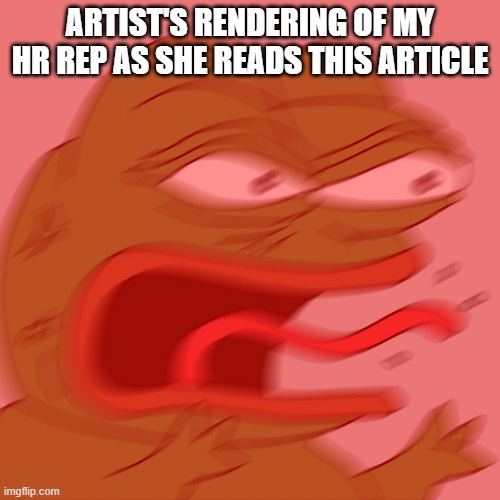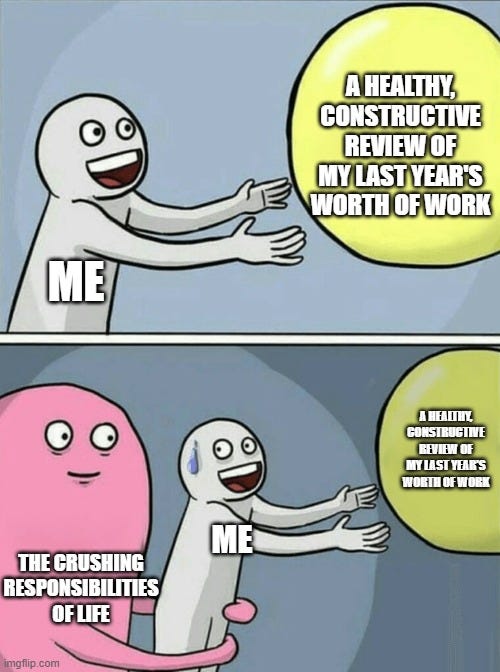You should be interviewing with other companies more often
How to make painful job searching a win-win
Welcome back to the latest edition on Rough Terrain. Switching up the format this time, moving the Rapid Fire section to the bottom and today’s main article to the top.
Today’s referral is RoundlyX. It’s the power of dollar-cost average purchasing by rounding up your daily purchases and using that change to buy crypto. It’s like Acorns but for new asset classes. So each time you buy something with your credit card, RoundlyX rounds that purchase up to the nearest dollar and puts it into the asset of your choosing. I’ve linked my 3 credit cards to it and used its multiplier tool so that it triples how much I invest so instead of just rounding up, it rounds up and multiplies that by 3. Now I’m doing dollar-cost averaging into $LUNA every day. Check it out!
Why You Should Be Interviewing More
This article goes out to all the HR reps who will hate my guts after reading this (if they even get past the title).
If you read this article and would like to learn how I do my own job shopping, tweet/forward/share this to some folks you think would benefit from also reading it. Tag me or send me proof and I’ll let you in on how I do it!
When’s the last time you took a step back and considered everything you’ve done in your current job? Or better yet, throughout your career? If you had to condense your career into a crisp narrative, could you?
I’m guessing the answers to those questions are a) it’s been a while, b) never, and c) nope.
We rarely take the time to sit back and reflect on ourselves, contemplate what we’ve achieved, or ask if we’re heading in the right direction. Lord knows I sure don’t. I’ve got an “annual reflection” worksheet sitting right beside me as I write this and if I’m being honest, I probably ain’t going to fill it out. I’m the type of person who’s always future-focused and as a result, almost never step back to evaluate the things in my past.
It’s generally accepted that this sort of self-reflection is a good thing. Looking back at your wins and losses and your own strengthens and weaknesses helps bring clarity to how you can continue to grow. What are you actually good at yourself vs. what has happened and you just happened to be along for the ride? This is important stuff to know. To thine own self, be true said Hamlet. Or as Richard Feynman put it, “The first principle is that you must not fool yourself, and you are the easiest person to fool”. If you’re not taking hard looks in the mirror on a regular basis, you will get fooled.
The problem most of us have is the incentive to do this sort of reflection. Of course it’s a good thing, but so is eating a lot of kale, doesn’t mean I’m going to do it. There’s a long, long list of things I SHOULD be doing. I’ve got the time and energy to do about 25% of the items on that list and some meta-review of all the things I’m good and bad is never critical enough to displace chores, work, and family responsibilities. I’m going to need you to get way off my back about it, alright? I’m barely holding onto my shit here.
There’s a reason we tend to set New Year’s resolutions (forget last year, here’s what I’m going to do in the future) instead of New Year’s retrospectives (what did I act like last year and how can I change).
So how do you bump this self-reflection to the top of the list? Well, you make a powerful incentive so that you really, really want to do it!
What incentive is that? Money, duh. And you know a way to make more money by doing a good retrospective? It’s called applying for a new job.
Applying for a job takes work. Or at least, applying well for a job takes work, I suppose you can always just wing it and see how far that takes you.
First, you need to job hunt for opportunities that appeal to you. Then you’ve got to clean up your resume so it’s interesting to the hiring manager of the job. Assuming you get a positive response, you have to go through the hiring process, which at a minimum is convincing the recruiter that you’re a potential fit, then charming the hiring manager on a phone call, then convincing a bunch of your potential-future-coworkers that you’re the right person for the job. It’s a lot!
It’s work that is well worth it. We mostly associate applying for a new job as a “tryout” where we hope to make the cut for the new job and get more money as a result. Yet job interviews are also a fantastic mechanism for forcing yourself to do all that retrospective analysis of yourself. When you get asked behavioral questions like “when did you last admit you made a mistake?” or “can you tell me a time when you had to tell an important stakeholder no?” you’re getting asked to evaluate your own competence and character. This is awesome! And if you’re well prepared for the interview, knowing these questions are headed your way, you’ve delved into your past to evaluate your wins and losses and condensed the lessons you’ve learned into digestible narratives.
It’s a double win. You’ve done a self-review that reaps the rewards of clarifying your own strengths and weaknesses PLUS you may have a new employment opportunity.
The allure of potentially getting a new job and of trying to impress a group of new coworkers is a powerful incentive to do the sort of self-help critical analysis of yourself that we all know we should be doing but never quite find the time to.
I know that I certainly don’t sit around asking myself when the last time I had to tell an important stakeholder no was. I do it frequently, but being the person I am, I don’t record it for posterity’s sake. The necessity of having an answer to that question means I have to sit down and dwell on that question. How often am I talking to my stakeholders and how often are those discussions involving me telling them no to a request of theirs? How are they taking that news? Am I delivering it with empathy and maintaining trust and rapport or is it a knives-out sort of situation?
Most folks tend to look for a new job when specific criteria get met. Either they are out of work and need a job or they are unhappy about their current situation and looking for an escape. This is a bad place to be, as you’re in a reaction mode to an un-optimal situation. This materially changes your motivation, lowering the standards for what you’re willing to accept in terms of new job offers. No bueno.
But what if you went job shopping before you ever got into that sort of situation? What if there wasn’t any pressure to accept an offer and you could evaluate the offer with clear eyes? Wouldn’t that be a much better experience? It’s the difference between casual window shopping vs. trying to find a gift for a loved one the day before Christmas.
What I propose is that everyone does a little more window shopping. Go apply for jobs at a casual pace. In my mind, casual means doing a serious interview with 1 company a quarter. More than that will take too much time and degrade your current job performance (remember, you are doing this because you want to, not because you’re in desperate need for a new job).
I think this is a win-win for employees and employers.
For the employee, it
Forces that retrospective you know you need to do but never get around to and keeps your list of strengths/win/weaknesses/opportunities fresh
Lets you get outside feedback on how valuable your experience is (in case you think you’re under or over appreciated in your current gig)
Gives you data points on how valued you are by the current employer vs. the potential new one (if someone is willing to give you a lot more money, that’s a good thing to know!)
Builds your professional network by exposing you to a new employer (just make sure you leave them with a great impression)
For the employer, it
Develops your bench of strong candidates so even if they don’t accept the offer, you could potentially reel them in later when interests align
Gets stronger candidates who otherwise wouldn’t be interested in changing jobs to apply to your open roles
Job tenure in tech tends to be 2-3 years, so the harsh truth all managers at all levels must accept that your people are job shopping anyway. You can cover your ears and close your eyes, trying to wish this fact away. Or, you can recognize that this is the nature of the industry and make it something that is healthy. I can’t for the life of me understand why we continue to make compensation, promotions, and new job opportunities something that is hush hush. If it’s important, shine a light on it.
Basic rule when job shopping
Don’t waste anyone’s time. Please don’t apply to a role that you can’t imagine yourself taking. Hiring is an expensive exercise and takes a lot of work for a lot of people. Be mindful of that cost. That’s why I recommend only doing 1 serious interview a quarter. You should have enough filtering criteria (location, title, company size, etc.) that there’s only a decent number of companies hiring for something that truly interests you.
If there is an offer, something to consider
Okay, so say that your job shopping has gone well and the new company is laying out an offer. There’s the obvious stuff, like the change in compensation and responsibility. But there are other important factors that too often get lost behind the numbers.
First, acknowledge the indirect benefits of your current job. There are things about it you may not appreciate until they are gone. How long you commute, how much fun you have with coworkers, how much trust leadership has in you, how much growth you’re going through, etc. There’s no way to but a number on this sort of stuff, but I imagine for most of us that a modest increase in salary isn’t worth changing employers if a lot of these intangibles are positive.
Remember - The grass is never green on the other side, it’s green where you water it.
Reminder - if you read this article and would like to learn how I do my own job shopping, tweet/forward/share this to some folks you think would benefit from also reading it. Tag me or send me proof and I’ll let you in on how I do it! Yes, I really am doing some cheap growth hack tactics in a desperate attempt to increase my reader count.
Rapid Fire
This is actually true for every job everywhere always
I don’t know what this lady’s problem is, this sounds like the greatest first date of all time
This was such a great article to pair with my recent reading of Team Topologies. Conway’s Law is such a powerful force that every manager of an organization needs to deeply respect and appreciate.
Did you know that the CEO of Ford Motor Company, Jim Farley, is a cousin to famous deceased comedian Chris Farley? Jim’s Twitter bio references the famous line by one of Chris’ reoccurring SNL characters. Awesome stuff.
Good summary article that matches my recent article on fractionalization. I really think we’re at the dawn of a new age where literally everything can a fiscal valuation wrapped around it.
At my last National Guard drill weekend, I had a chance to sneak away to my old stomping grounds at 1st Special Forces Group’s gym. Back when I was stationed there, my favorite workout was a 5-minute conditioning drill where you pushed a 45lbs weight lifting plate 25 meters down and 25 meters back to the starting line as many times as you could. I briefly held the gym record with 22 laps. Suffice to say that 7 years later, having not done it once since, my score was… lower.











